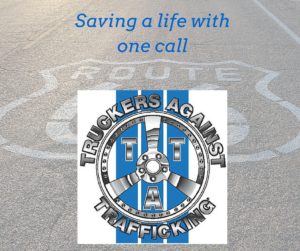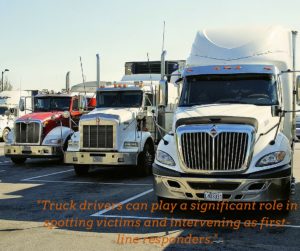Truckers across America are taking a stand in the anti-trafficking movement. Why truckers, you ask? Think of the typical setting in which truckers work and stop on their long routes: remote locations along American roads and highways, as well as truck stop parking lots that sometimes serve as fertile grounds for the sexual exploitation of women and girls, particularly since the industry is male-dominated.
Recognizing the unique intersection of the trucking industry with the issue of human trafficking , the nonprofit Truckers Against Trafficking (TAT) was formed to educate and empower members of the trucking and travel plaza industry about human trafficking. What TAT seeks to do is empower truck drivers to be more than bystanders. According to TAT co-founder Lyn Thompson, human trafficking is frequently a mobile crime. This means truck drivers can play a significant role in spotting victims and intervening as first-line responders. Truck drivers can make an impact by alerting law enforcement to the presence of sex trafficking at truck stops, rest stations, and welcome centers across the country. Their presence as the eyes and ears on America’s highways gives new meaning to the commonly held phrase, “If you see something, say something.”
, the nonprofit Truckers Against Trafficking (TAT) was formed to educate and empower members of the trucking and travel plaza industry about human trafficking. What TAT seeks to do is empower truck drivers to be more than bystanders. According to TAT co-founder Lyn Thompson, human trafficking is frequently a mobile crime. This means truck drivers can play a significant role in spotting victims and intervening as first-line responders. Truck drivers can make an impact by alerting law enforcement to the presence of sex trafficking at truck stops, rest stations, and welcome centers across the country. Their presence as the eyes and ears on America’s highways gives new meaning to the commonly held phrase, “If you see something, say something.”
TAT offers a training DVD and an online course to complete for certification. They also provide a wallet card
containing human trafficking warning signs and the toll-free hotline number for the National Human Trafficking Resource Center. Truckers are also informed about the harm of common words and phrases used at truck stops to refer to prostituted persons—terms such as “bunk bunny,” “parking lot hostess,” “road Juliet,” and “pavement princess” are all names used for women exploited by sex buyers. Such labels for individuals exploited by sex buyers are pejorative and normalizing of sexual exploitation. Additionally, the men engaging in commercial sex can be referred to as “lot lords,” while “party row” indicates the location at a truck stop where truckers park for commercial sex.
The Colorado-based, non-profit recently partnered with the National Center for Missing and Exploited Children to raise awareness of the instrumental role that trucker drivers can have on recovering missing children, particularly in remote areas. The partnership spurred the development of a High-Risk Child poster initiative. These posters have been distributed to TAT’s participating drivers in order to assist in identifying missing youth who are at high–risk for sex trafficking.
TAT’s work has stimulated significant growth in the responsiveness of truck drivers to domestic sex trafficking. Since  its inception in 2009, TAT’s 180,000 participating truckers have identified 415 likely human trafficking cases and made more than 1,300 calls to the National Human Trafficking Resource Center. As a result, over 700 trafficking victims have been rescued, with nearly a third being minors. A recent story from TAT reported that a veteran truck driver called the hotline after being approached by a young girl at a truck stop asking for money to return home. He suspected the girl was a potential victim when she finally got into a car with a waiting driver. Using his knowledge from TAT, the driver called and provided a description of the girl and location. Following an alert to local law enforcement, an investigation was opened immediately.
its inception in 2009, TAT’s 180,000 participating truckers have identified 415 likely human trafficking cases and made more than 1,300 calls to the National Human Trafficking Resource Center. As a result, over 700 trafficking victims have been rescued, with nearly a third being minors. A recent story from TAT reported that a veteran truck driver called the hotline after being approached by a young girl at a truck stop asking for money to return home. He suspected the girl was a potential victim when she finally got into a car with a waiting driver. Using his knowledge from TAT, the driver called and provided a description of the girl and location. Following an alert to local law enforcement, an investigation was opened immediately.
Corporations including Volvo, Ryder, Great Dane, and UPS are already on board to train and inform their truckers of the dangers of sex traffickers. We applaud Truckers Against Trafficking for providing truck drivers with the tools necessary to stop perpetuating a cycle of modern-day slavery in the U.S. Their efforts remind us all to be a bit more vigilant and proactive the next time we make a roadside pit stop.



